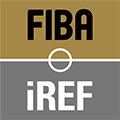The second day of the U17 Men's Basketball World Cup Pre-Competition Camp kicked off with a group debrief, followed by focused breakout sessions. Each group, comprised of referees who were supported by a Referee Instructor and a Video Operator, analyzed game clips, identifying strengths and areas for improvement. This collaborative approach fostered a deeper understanding of officiating nuances and promoted shared learning among the referees. An additional key focus of the day was the application of protocols in basketball officiating, ensuring consistent decision-making on the court.
In the afternoon, the referee crew headed to a basketball court for a physical activation session led by Alejandro Vaquera, FIBA's Global Referee Fitness Coordinator. This session aimed to ensure referees are physically prepared for the demanding tournament ahead.
The day continued with a session led by Referee Instructors, focusing on on-court movement and the practical application of Individual Officiating Techniques (IOT). This hands-on approach helped referees refine their positioning and decision-making in real-game scenarios.
After a short break, the evening session resumed with continued clip analysis in the meeting rooms. Building upon the previous day's team scouting results, referees began developing an action plan tailored to the specific teams and play styles they'll encounter during the World Cup. This targeted approach demonstrates the commitment to thorough preparation and a deep understanding of the game.
A session presented by basketball Coach Nelson Isley on typical play situations further enhanced the referees' knowledge and anticipation of in-game scenarios, rounding out a productive and informative second day of the Pre-Competition Camp.
As for the key takeaways of day two, referee Daigo Urushima from Japan highlights that ‘Refs need to be good, especially at two aspects: rules and managing the game clock. This helps fix timing mistakes like resetting the shot clock by using the "magic time," and makes tough calls easier, like 50/50 decisions on whether a foul happened during a shot. The protocols help refs make quick decisions without needing to talk too much.’
According to another referee, Martin Horozov, Bulgaria, ‘Protocols are like shortcuts to the right decision for referees, helping us make quick, correct calls during tough situations. When we're not 100% sure about a foul type, or whether a shot was on time, we can use the protocols as a guide to get it right.’
Referee Ariadna Chueca from Spain claims that ‘The scouting process, starting seven days before arrival, involved pairs analyzing individual teams and creating detailed action plans. This, along with group discussions focusing on commonalities, helped referees develop a shared understanding and consistent approach for officiating the World Cup games.’
FIBA Referee Instructor from Canada, Nadine Crowley states that ‘On-court training is a crucial part of preparing referees for the U17 Men's Basketball World Cup, as it allows them to practice handling real-game situations and build rapport with their fellow officials. This hands-on experience helps the referees develop a unified approach to officiating, with the intent of creating consistency throughout the tournament.’
